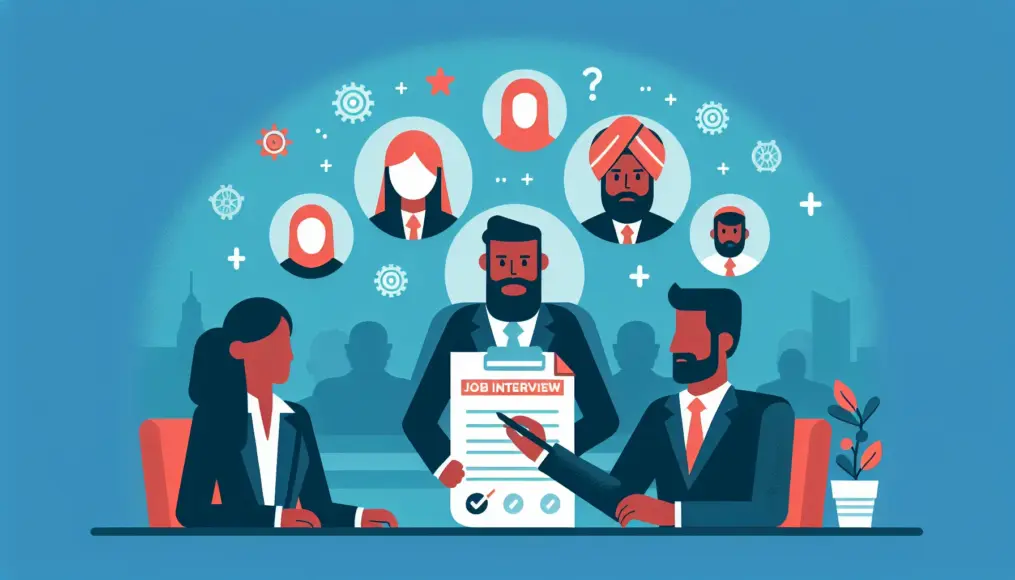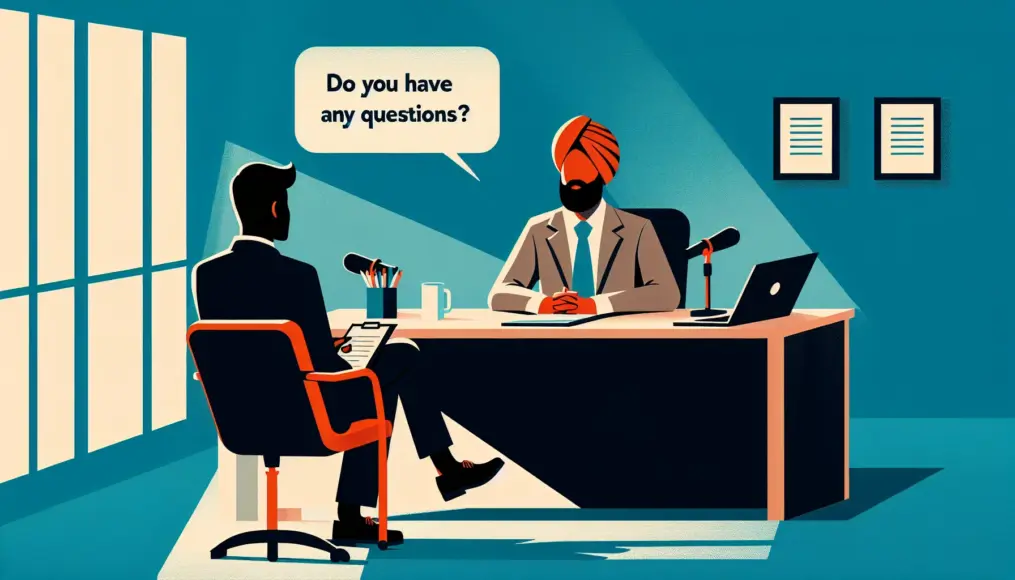To achieve success in job interviews, thorough preparation is key. Understanding the purpose of the interview and the qualities that employers are looking for will enable you to present yourself more effectively.
In this article, we’ll explore the steps you need to take to prepare for your interview, how to craft your self-introduction, and the importance of following up afterward.
- It’s crucial to grasp the basics of the interview and clarify your goals.
- Conduct thorough research and simulate the flow of the interview.
- Learn how to create an impactful self-introduction and write effective thank-you emails.
Understanding the Basics of Job Interviews
When it comes to job interviews, grasping their purpose is crucial.
By understanding what a company is looking for, you can better align your strengths and tailor your self-presentation.
In this section, we’ll delve into the objectives of interviews and the traits companies typically seek in candidates.
What is the Purpose of an Interview?
The primary purpose of an interview is to match candidates with the type of talent a company desires.
Through the interview process, companies evaluate candidates’ skills and personalities, envisioning how they would fit into the workplace.
Conversely, candidates also have the opportunity to gauge the company’s culture and values.
It’s an essential exchange of information for both parties.
- Interviews aim for a match between the company and the candidate.
- Companies assess candidates’ skills and personalities.
- Candidates learn about the company’s atmosphere and values.
Traits Companies Look For
The traits that companies seek can vary by industry and position, but they generally prioritize candidates who align with their company culture.
For instance, in workplaces where collaboration is key, a strong team-oriented mindset is highly valued.
Additionally, many companies emphasize qualities such as flexibility and problem-solving skills.
Reflecting on how you fit into these desired traits can help clarify your key selling points during the interview.
For tips on preparing for interviews, check out Essential Preparation Tips Before Job Interviews.
- Companies look for individuals who fit their culture.
- Collaboration and teamwork are valued in many workplaces.
- Flexibility and problem-solving skills are also critical attributes.
A Comprehensive Guide to Preparation Steps
Before heading into job interviews, thorough preparation is essential.
Conducting research ahead of time allows you to grasp the interview’s flow and understand the company’s characteristics.
In this section, we’ll break down the preparation steps into two key points.
The Importance of Pre-Interview Research
Pre-interview research is the key to a successful interview.
By gathering information about the company, you can clearly articulate how you can contribute during the interview.
For instance, being aware of the company’s philosophy, vision, and recent news can empower you to respond confidently to questions during the meeting.
Additionally, understanding the company culture and work style provides valuable insights into how well you might fit in.
- Conducting pre-interview research helps you gather essential company information.
- It assists you in thinking about how you can contribute to the company.
- Understanding the company culture and work style allows you to evaluate your fit.
Simulating the Interview Flow
Simulating the interview process helps you mentally prepare.
It’s a good idea to practice answering questions and introducing yourself as if it were a real interview.
Enlist the help of friends or family to conduct mock interviews, which can also help alleviate nervousness.
By familiarizing yourself with the flow in advance, you’ll be better equipped to handle the actual interview with composure.
If you’re looking for specific examples of self-introductions for interviews, check out the Guide to Self-Introduction Examples for College Students! Key to Success?.
- Conducting mock interviews helps you prepare mentally.
- Practicing questions and self-introductions is beneficial.
- Familiarizing yourself with the flow beforehand allows you to approach the interview calmly.
How to Showcase Yourself Effectively
In job interviews, it’s essential to make a strong impression by showcasing your strengths.
By preparing a compelling self-introduction and highlighting key points that resonate with interviewers, you can maximize your appeal.
In this section, we’ll delve into how to craft an effective self-introduction and identify the points that will resonate with interviewers.
Crafting an Effective Self-Introduction
Your self-introduction is a critical first step in presenting yourself.
It’s important to communicate your strengths clearly and concisely.
For instance, in your self-introduction, you should mention your name, school, major, and areas of interest or passion.
Additionally, incorporating past experiences and achievements can leave a lasting impression on the interviewer.
- Introduce your name, school, and major
- It’s important to convey your areas of interest
- Effectively highlight your past experiences and accomplishments
Key Points to Resonate with Interviewers
To connect with interviewers, it’s crucial to align your personal traits with the qualities the company is looking for.
For example, if the company values teamwork, you should share specific examples of how you’ve excelled in a team setting.
Moreover, explaining how your skills and experiences can contribute to the company’s success is equally important.
By tailoring your self-presentation to fit the company’s needs, you can leave a stronger impression.
Additionally, to prepare thoroughly for your interview, you might find it helpful to refer to the Tips for Standing Out in Customer Service Interviews: Common Questions and Success Strategies.
- Tailor your presentation to align with the company’s desired traits
- It’s essential to share your teamwork experiences and specific examples
- Explain how you can leverage your skills to make a meaningful contribution
Don’t Forget to Follow Up After Your Interview
Following up after a job interview is crucial.
Sending a thank-you email can leave a positive impression on your interviewer.
Additionally, it’s important to think about actions that could lead to the next steps in the hiring process.
In this section, we’ll dive into how to write a thank-you email and tips for moving forward.
How to Write a Thank-You Email
It’s recommended to send your thank-you email right after the interview.
The key is to express your gratitude.
Be specific—reflect on topics discussed during the interview and reaffirm your interest in the company.
By crafting a thoughtful email, you can effectively communicate your enthusiasm to the interviewer.
- Sending a thank-you email right after the interview is essential.
- Make sure to convey your gratitude with specific examples.
- Reiterate what you learned during the interview and your interest in the company.
Thinking About the Next Steps
After your interview, it’s also important to consider the next steps.
In your thank-you email, you can inquire about the schedule for the next interview or the selection process.
Furthermore, reiterating your strengths and fit for the role can enhance your chances in the hiring process.
Taking these actions will help you maximize the impact of your interview.
For more tips on following up with a thank-you call, check out Tips for Thank-You Calls After an Interview! 5 Key Points to Success.
- It’s important to confirm the schedule for the next interview or selection process.
- Reiterate your strengths in your correspondence.
- Take actions to maximize the impact of your interview.
Conclusion
Preparing for job interviews is a crucial step toward success.
By grasping the basics of the interview process and engaging in thorough research and practice for your self-introduction, you can effectively showcase your strengths.
Don’t forget to follow up after the interview; this can help pave the way for the next steps in your job search.
- Understand the purpose of the interview and the qualities the company seeks in a candidate.
- Conduct thorough research and prepare your self-introduction meticulously.
- After the interview, send a thank-you email and confirm the next steps.
Wishing you all the best in your job search—feel free to use this guide as a reference!
If you have any comments or questions, don’t hesitate to reach out!



Comment